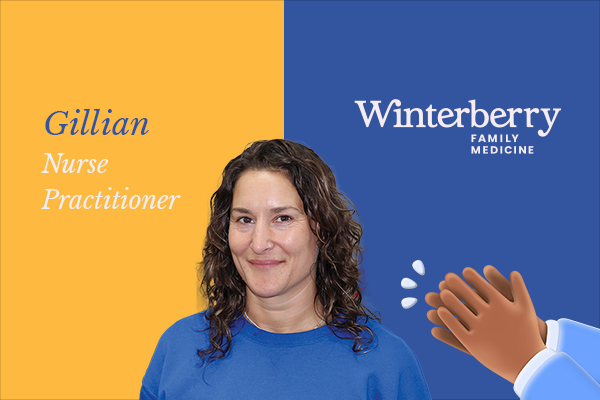At Winterberry we help our patients live their best life and part of our “whole body” care is offering easy access t our team of highly skilled and caring dietitians. Seeing a Winterberry dietitian is easy. Just call the clinic at 905-575-9004 and book an appointment with one of our nurses or nurse practitioners. Let them know you want to see a dietitian and they will get your appointment booked.
You might be wondering what dietitians do, how they’re trained and what their role in the clinic is. That’s understandable because not a lot of people know just how valuable and important dietitians are and how they contribute to health. This blog will:
- Answer all of your questions using information provided by Dietitians of Canada
- Introduce you to each of our dietitians
- And we’re even sharing a recipe they recommend!
What is a dietitian?
According to the Dietitians of Canada, Dietitians empower their patients, clients, and communities to embrace food, to understand it, and to enjoy it. The advice and information they provide is tailored to their clients and patients personal needs and challenges, including taste and accessibility. They translate the science of nutrition into terms everyone can understand to support healthy living for all Canadians.
Dietitians believe in the power of food to enhance lives and improve health.
How common are dietitians?
Again, according to the Dietitians of Canada, dietitians are everywhere. Whether collaborating with other healthcare professionals, undertaking scientific research, driving innovation in the food industry, informing public policy, or working with patients and communities across the country, our influence runs deep and it continues to grow.
Why would I need to see a dietitian?
Dietitians can support you throughout many phases of your life from pregnancy to eating well when you are older. Counseling sessions with a dietitian can also help you to prevent and treat health conditions like diabetes and heart disease.
At Winterberry, dietitians work as part of a team of other health care professionals like doctors, nurses, physiotherapists and speech pathologists.
What are some concerns that a dietician can help me with:
Diabetes
Heart health
Cancer
Food allergies
Digestive concerns
Weight loss or weight gain
Infant and child feeding and nutrition
Picky eating
Malnutrition
Pregnancy or breastfeeding
Sports nutrition
Vegetarian and vegan diets
Meal planning
A dietitian will work with you to give you advice and information that is right for you by considering your culture and food traditions. They will also think about your personal needs and challenges, including taste, food skills, budget and health conditions. Dietitians help you cut through the clutter by consulting the latest scientific evidence and providing you with personalized guidance.
What happens when I see a dietitian?
The first appointment, whether it be in-person, online, or on the phone, will be about 45 minutes to 1 hour. During this appointment, your dietitian will ask you questions to get to know you and the reason you contacted them. You may want to make changes in the way that you eat, have a food allergy, digestive issue, or you have a nutrition-related health condition like diabetes, heart disease, or high cholesterol. Each person’s reason for speaking with a dietitian is different. A dietitian’s job is to work with you as a partner to look at your needs and set goals.
What kind of questions will my dietitian ask me?
Your dietitian will need specific details about you to give you personal and practical information that you can use. The questions your dietitian will ask you will depend on the reason you are visiting them but may include:
Your current diet
What types of foods you or your family like to eat
Your culture and food traditions
How often you eat
How much you eat
When you eat
Where you eat
Your food skills
Your food budget
Any concerns you have about your eating habits
Your general health/medical history
Any medications or supplements you take
Any challenges you face buying preparing or eating foods
Whether you require specific equipment to eat or prepare food
Your height, age and weight (to access your nutritional needs)
How often you exercise
Asking these questions will help your dietitian get an idea of your diet and lifestyle and any healthy or unhealthy habits that you have. It also gives them the information that they need to do a nutrition assessment. This means that your dietitian can figure out if you are getting too much or too little of anything in your diet.
What will I take away from my first visit with a dietitian?
Your dietitian will use or give you resources to help you with your goals like food models to show you healthy portion sizes, sample meal plans, healthy recipes, or a grocery shopping list template. You may be given written information to take home with you.
Always feel free to ask your dietitian questions or let them know about any concerns that you have during your appointment.
Will I have more than one appointment?
You should expect to have a follow-up appointment. Diet and lifestyle changes are a gradual process and learning new information and skills can take time. A follow-up appointment is generally shorter and costs less than an initial appointment. You and your dietitian can decide on the number of appointments that you need and when they should be.
During a follow-up appointment, your dietitian will track your progress, provide you with more tips and information, adjust your nutrition plan based on how things are going, and discuss the next steps. These appointments allow you to ask questions, talk about what’s going well, what’s not going well, learn about new tools or resources and receive support and feedback from your dietitian.
What training does a dietitian have?
Dietitians are qualified to give you nutrition advice and information. They have a degree in food and nutrition from an accredited university program. They complete practical training and have to pass a national licensing exam*. Like all regulated health professionals, dietitians must stay on top of new research, skills, and techniques. Dietitians do this by taking courses to improve their skills and knowledge every year. Dietitians are the best source for nutrition and food information.
What is the difference between a dietitian and a nutritionist?
Dietitians are trained and regulated to ensure that you and your family receive safe and effective nutrition care, just like your dentist or family doctor.
The title “dietitian” is protected by law across Canada. This means, in Ontario only people who meet certain criteria and standards can call themselves a dietitian whereas anyone can call themselves a nutritionist.
To be sure, you are working with a qualified nutrition professional, look for the initials RD or PDt (DtP in French) after the person’s name.
An important note: Titles like Registered Holistic Nutritionist and Certified Nutritional Practitioner are not the same as Dietitian. People using these titles are not provincially regulated health professionals. Dietitians are the only nutrition professionals regulated by law. Often people who have completed privately owned training programs use these titles. The length of training and education needed to use these titles vary.
Is there a code of ethics Dietitians must follow?
Check out this quick video from the College of Dietitians to learn more about their Code of Ethics.
Let us introduce you to our team of highly skilled and caring Dietitians:
Elizabeth Muggah (she/hers) MSc, RD, RSE
Registered Dietitian
A little bit yourself and what inspired you to become a dietician?
I am originally from Cape Breton Island, growing up in Sydney, NS.
I started my career in the kitchen. I have always loved cooking. I decided to follow my passion and attended culinary school at Nova Scotia Community College. I have my Red Seal in cooking which required 5400 hours of work in professional kitchens along with the successful completion of a national exam.
After graduating from culinary school I decided to pursue my interest in nutrition and enrolled in a Bachelor of Science in Nutrition at Acadia University. After finishing my dietetic training, I worked as a Dietitian and Food Service Manager for Brigadoon Village, a camp for children and youth living with chronic illness and/or other life challenges. I moved to Southern Ontario to complete a Master’s degree in Food Science at the University of Guelph. Here I researched ways to improve food service delivery in long term care.
My interest in nutrition started due to sport. In high school, I played volleyball and ran track and cross country. I became interested in the role of nutrition in performance. Growing up, cooking and eating together was very important in my household. My Dad passed down his love of cooking to me. Becoming a dietitian was a great fit with my interests and personal values.
What’s your favorite part of your day at Winterberry?
I like when I can have fun with my patients. I love food and helping patients see how they can add variety to their diet; that’s really rewarding. When an appointment with a patient is finished my goal is for them to feel motivated, excited about food and being able to enjoy it. I also want to be sure they have felt heard and listened to and that they know the information they got was personal and specific to them.
What simple advice can you give readers that can make a big difference?
- Small steps add up and letting go of the all or nothing mentality – this can hurt a lot of our efforts. Focus on a couple of things at a time and make those a habit and then move forward.
- Get more vegetables on your plate. Vegetables provide fibre, micronutrients, and add a variety of textures and flavours to your meal. Try planning to serve a hot and cold vegetable with dinner.
Samantha Plantic, Professional Masters Diploma (Dietetics), BASc (Nutrition and Food), SCOPE certified, World Obesity Federation
A little bit yourself and what inspired you to become a dietician?
My name is Samantha, a Registered Dietitian at Winterberry Family Medicine. A bit about myself: I enjoy hosting dinners for friends and family, hiking and biking the many trails of the Niagara Region (born and raised!), exploring the seas and cuisine of my Croatian homeland, and am a lover of all things coffee.
As a young student pursuing my Biochemistry degree at Brock University, I gained an understanding—both in the lecture hall and in my personal life—of how nutrition directly impacts our mental and physical health. It was during this time that I started to be more mindful of my food choices and lifestyle, and felt more energized, focused, and confident because of it.
I directed my career path toward dietetics to help others, too, realize their health goals, while nurturing their relationship with food and navigating a world of conflicting health claims. Through an enriching road pursuing my nutrition degree and Professional Masters Diploma in Dietetics at St. Michael’s Hospital, I have come to realize that nutrition is an essential, personal, cultural, and rather complicated aspect of our lives. I work with my patients to make nutrition less complicated, and strive to use an additive approach in my counseling: what foods, physical activities, and self-care strategies can we add to reach our health related goals? I look forward to working with you!
What is the best part of your day at Winterberry?
- Being a “Myth Buster.” In a world of diet fads and false nutrition information, I am happy to offer evidence-based nutrition information to our patients.
- Relationship building and celebrating patient success. I love collaborating with our clients to break down the barriers that hinder their health goals, recognizing the privilege of offering a listening ear when times are tough, and celebrating their achievements.
- You! I am very fortunate to work with the compassionate and knowledgeable team members at Winterberry Family Medicine, collaborating to achieve patient-centred care.
Nadia Browning (she/her), MAN, RD
A little bit yourself and what inspired you to become a dietician?
My name is Nadia Browning, and I am overjoyed to be working as a Registered Dietitian with Winterberry Family Medicine.
I recently completed my Master’s in Applied Nutrition at the University of Guelph, where I also received my undergraduate degree in Applied Human Nutrition (Go Gryphons!!). Throughout my education, I developed the skills needed to provide evidence-based, patient-centered nutrition recommendations.
I grew up in a large Italian family, where food was at the center of every birthday, holiday, and visit. So, naturally, I pursued a career in food and nutrition! My love for food led to a curiosity about how nutrition impacts our health. In the media, I was met with a large amount of misinformation, diet culture messaging, and recommendations that failed to consider the social determinants of health (such as economic stability, access to education and health care, environment, and social context). I decided that by becoming a Registered Dietitian, I could promote healthy relationships with food, challenge diet culture, and advocate for a lens on individual health that considers the social determinants of health.
In addition to my love for food, I also love spending time outside! I have set a couple of goals for myself with regards to outdoor activities this year, including learning to downhill ski and successfully keeping a garden this summer. Wish me luck!
What is the best part of your day at Winterberry?
The best part of my day at Winterberry is interacting with the Winterberry team members! Everyone is always so welcoming and supportive. New learning opportunities are always provided and encouraged, which enables us to provide the best possible care to patients. Furthermore, I always look forward to meeting with my fellow Registered Dietitians, there is so much we can learn from each other’s experiences!
Alexandra Venger, MPH, RD, Scope Certified, Level 1, 2 Motivational Interviewing
A little bit yourself and what inspired you to become a dietician?
My name is Alexandra Venger, a Registered Dietitian (RD) from Toronto, now working with the wonderful staff and patients at Winterberry Medical.
I completed my Honours Bachelor of Applied Science degree in Food and Nutrition from Western University in 2015, and Masters of Public Health degree specialized in Health Systems Administration and Global Health Leadership from Haifa University in 2021. I have been fortunate to be working as a dietitian for nearly 5 years in areas of clinical nutrition and chronic disease management, sport nutrition, public health and community nutrition.
I became a dietitian because I wanted to help others and was fascinated by the role of nutrition. It’s hard to say what first inspired my passion for nutrition and dietetics, but it was likely a combination of my family and coaches that valued healthy eating. Growing up in a Russian-Israeli household there was always healthy food (and Bamba) in the house. In high school I was a wrestler, and having to make weight was a natural part of the sport. The rest they say is history. My love for nutrition and helping others blossomed into a career as a dietitian where I have been fortunate to work with people from all over the world.
What is the best part of your day at Winterberry?
The best part of my day at Winterberry is speaking with patients. I enjoy learning about their unique health and nutrition needs and getting to know them at a level where I can help them achieve their goals. It makes me feel like I can give back my nutrition knowledge and experience to help them achieve their goals and improve their health. To me this is rewarding and continues to fuel my passion for nutrition and helping others.
What simple advice would you give a patient that can make a big difference in their nutrition and health?
Don’t eat in front of the TV. Often, people engage in mindless eating, such as eating while working or watching the latest show on Netflix. Like Pavlov’s dog, we are essentially conditioning ourselves to salivate as soon as we turn the TV or computer on, even if we aren’t hungry. Instead, aim to minimize distractions while eating, by turning off electronics, so that you can be more mindful of how much and what you are eating.
As promised, we’re sharing a recipe that will help get more vegetables on your plate. This delicious dish was created by Elizabeth Muggah, MSc,RD,RSE and we’re sure it will become a favourite in your kitchen:
Simple Roasted Broccoli (~3-4 servings)
Prep time: 5 minutes
Cook time ~25 minutes Preheat oven to 375°F (190 °C)
Ingredients:
1 head of broccoli cut into florets
1 tbsp olive or canola oil
½ tsp garlic powder
Salt and pepper to taste
Optional: a shake of your favourite seasoning, you can customize this recipe to any entrée.
Directions:
- Toss ingredients together in a bowl until the broccoli is evenly coated with oil and seasoning.
- Place evenly onto a baking sheet and bake in a 375 °F oven for 25 minutes or until the edges of the broccoli are golden brown. Toss the broccoli half way through cooking.
- Enjoy!
Looking for more information about Dietitians?
Dietitians of Canada www.dietitians.ca
College of Dietitians of Ontario www.collegeofdietitians.org
And remember, booking an appointment with a Winterberry Dietitian is easy. Call the clinic at 905-575-9004 and book an appointment with a Nurse or Nurse Practitioner.


